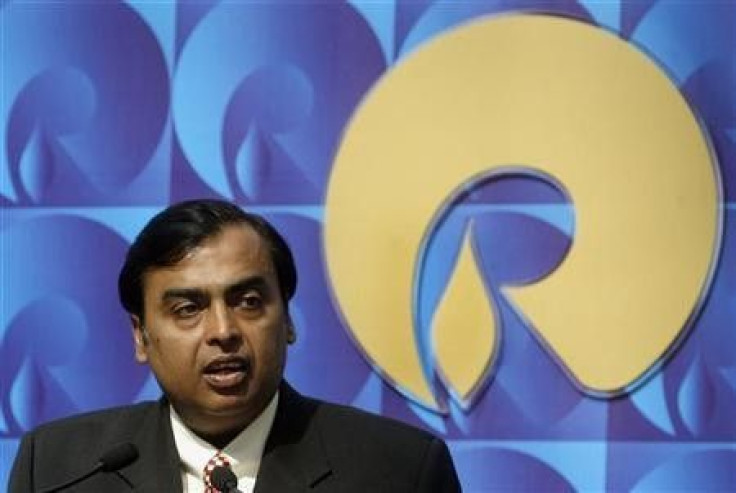RIL Q3 Profit Falls; Will Buy Back up to 120 Million Shares

Energy conglomerate Reliance Industries reported its first quarterly profit drop in more than two years, and moved to bolster its underperforming shares by announcing a share buyback of up to 104.4 billion rupees.
Reliance, India's biggest company by market value, said it would buy back up to 120 million shares at a maximum price of 870 rupees, its first share buyback since 2005 and the biggest ever in India.
At the maximum price, the buyback represents an almost 10 percent premium to Reliance's closing share price of 792.65 rupees on Friday.
Reliance, which has a market capitalisation of about $51 billion, said it held cash and cash equivalents of $14 billion as of the end of December.
Historically, whenever there are sugar-coated cookies such as a buyback, it's a prelude to bad news, said Mohit Mirchandani, head of equity at brokerage Religare's portfolio management business.
But it's also a positive indicator that they are close to the bottom of the petchem business cycle. Smart investors would look to buy the stock at this point, said Mirchandani, whose firm manages about $400 million.
Controlled by Mukesh Ambani, the world's ninth richest person according to Forbes, Reliance's market value tumbled 35 percent in 2011, mainly because of worries that falling output from its offshore gas fields would hurt its long-term growth.
The stock has also underperformed the BSE Sensex, which fell nearly 25 percent in the same period.
Reliance has not made any major investments in its core energy and refining business since buying stakes in three U.S. shale gas joint ventures in 2010.
The company is awaiting government approval of an investment plan for its oil and gas blocks off India's east coast, but it sold stake s in several of those blocks to BP (BP.L) last year in a $7.2 billion deal, adding to its cash pile.
Reliance plans to invest up to $4.5 billion by 2014 in its U.S. shale gas joint ventures. It is also reported to be in talks to buy the exploration and production unit of U.S. pipeline firm El Paso Corp, but has been looking to expand beyond its core business.
Earlier this month, it invested in TV18 media group. It plans to launch broadband services using fourth-generation (4G) technology later this year and has also been speeding up the opening of supermarkets across the country.
Q3 PROFIT DROPS
Reliance posted a 14 percent fall in October-December net profit, as refining margins fell sharply.
Net profit fell to 44.4 billion rupees for the fiscal third quarter ended December 31 from 51.36 billion a year earlier. Net sales rose 42 percent to 851.35 billion rupees.
A Reuters poll of brokerages had forecast a net profit of 48.1 billion rupees on net sales of 819.9 billion.
The company reported gross refining margins of $6.80 per barrel for the quarter, compared with $9.00 a year earlier, and sharply below the $10.10 it reported in the September quarter.
The global nature of our businesses and weakness in economic conditions resulted in reduced earnings in the quarter, particularly in our refining and petrochemicals businesses, Ambani, the company's chairman, said in a statement.
Reliance operates the world's biggest refining complex in Jamnagar, which can handle less costly high-sulfur crude oil, giving it among the best refining margins in the industry. Refining accounts for nearly 80 percent of Reliance's revenue.
The margins were squeezed by higher crude prices and a narrowing spread between light and heavy crude prices.
Reliance's oil and gas exploration business posted a 32 percent decline in revenue, mainly on account of lower production at its main D6 offshore block.
The company's growth outlook has been marred by falling gas output from its huge gas fields off India's east coast.
Reliance is producing around 40 mscmd (million standard cubic metres per day) of gas, sharply below the 60 mscmd it was producing a year earlier.
There may be some knee-jerk share reaction on Monday. The fall in profit is likely to overpower the slightly better-than-expected buyback price, Religare's Mirchandani said.
© Copyright Thomson Reuters 2024. All rights reserved.











